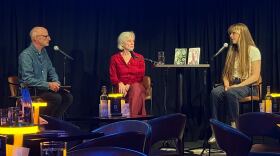Our Week of Summer Favorites continues with a look at teen reading. Smartphones, e-readers, and other internet-based content, like Twitter and Facebook, are changing how and what teenagers read. And despite the image of adolescents with their faces in their phones, it turns out young adult fiction is among the most successful types of books on the market.
This show originally aired on June 12, 2017.
GUESTS:
- Michael Sullivan - Director of the Weare Public Library, and a national speaker and writers on boys and reading, including the book, Raising Boy Readers.
- Erin Moulton - Teen librarian in Derry, and author of young adult novels.
- Nancy Keane - Library media specialist at Rundlett Middle School in Concord.
Scroll down in this post to see recommended books, as well as helpful links for parents and teens.
Are teens reading less?
Erin Moulton:
We see teens in the library for a lot of different reasons. But they do read a lot. I think it is a factor of time for a lot of teens. They do have a lot on their plates, they're doing a lot of sports, maybe they're in Honors society. But for free time, recreation, they do go back to the book. . . A lot of the time when people see teens, they are on their device(s). However, teens are sometimes in a little nook by themselves, or at the library at school reading, or hidden away reading. It's not, you know, sitting in the living room with the family, necessarily.
Nancy Keane:
I think there's a decline in reading, but I think a lot of it is the adult reading. I don't think you have a lot of adults reading and showing the kids that it's a cool thing to do, or a good thing to do. As far as the kids reading, I don't see a huge decline. They read in their own way, and they have their own fanfiction and their own way of looking at books that we may not understand.
We had Erin Bowman [a local author] come in and do a writer's workshop for our kids [at Rundlett Middle School] and her first question was, 'How many of you have written a book?' and just about every child raised their hand. They've all written, they love working with a published author, working on their books. Kids are writing, as well as reading.
Putting pressure on teenagers to read certain books or at a certain level may discourage reading.
Michael Sullivan :
Up until about third, fourth grade, kids are learning how to read. It's a new experience for them, and it's something that adults do with them. It's a low pressure, low stress kind of thing. . . Somewhere around third grade going into fourth grade, they just tend to hit a way, and it's because we change how they interact with reading. They stop learning to read and start reading to learn, and suddenly it becomes very important what level you're reading at, what type of thing you're reading -- is it good reading? Is it bad reading? Is it too low, is it too high?
Erin Moulton:
For a while, teens would come [into the library] and say, 'I have a Lexile level of 'this', can you find me a book?' I have no idea how to give a reading recommendation based on a Lexile level. It's the measure of. . . how much vocabulary, how long are the sentences, and each of those factors give [a student] a higher or lower Lexile level.
So then I would have to say, okay, back up for a reference interview. What do you like to read? What are your favorite books to read? If you haven't read a book in a while, what's your favorite show to watch, or what's your favorite game to play. Let me find something that's similar to that, and then we'll check and see if it's in the Lexile level.
Listener Kendralynn, age twelve, agrees:
I enjoy higher level books, but sometimes I'm not supposed to read those, because I can't understand the content that's happening. Sometimes I get a little mad, because I can't read what is at my level because I don't understand the content.
Comic books and graphic novels are great for teens who don't love to read, and those who already love reading.
Michael Sullivan:
A lot of kids that won't read anything else for fun will pick up a graphic novel. It's also a great way of expanding the reading of kids who read a ton. . . graphic novels can present challenges to storytelling, they can make storytelling easier or harder, they just appeal to so many.
Recommended Books For All Different Types Of Teenage Readers:
SERIES:

Captain Underpants Series by Dav Pilkey:
- These books follow the adventures of the creative underdogs George and Harold, who think up and bring to life the goofy superhero Captain Underpants.
The Babysitters Club Series by Ann M. Martin:
- This series follows a group of girls who run a babysitting service together and address life problems like divorce, jealousy, illness, and more.
The Goosebumps Series by R.L. Stine:
These books are a classic collection of children’s scary stories, which spawned classics like One Day at Horrorland, Night of the Living Dummy, and even a television series.
The Legend Series by Marie Lu:
- Two teens in a dystopian society that determines worth through a series of intelligence and fitness tests are united following tragedy (also available as graphic novels).
The Luck Uglies Series by Paul Durham:
- A fantasy and adventure series about a girl on a quest for the Luck Uglies, exiled people who can save his town from the monsters invading it.
The Taken Trilogy by Erin Bowman:
- In a town where all boys vanish at midnight on their eighteenth birthday, Gray hunts for the truth before he too disappears.
Minecraft Novels and Strategy Guides:
- From the world of Minecraft, the massively successful game. Find "13 of the Best Minecraft Books for Kids Who Are Reluctant to Read."
FOR TEENS WHO LOVE GOTHIC AND CREEPY STORIES:
- Fans of fantasy and the supernatural might want to check out The Dark Tower series.
Jonathan Stroud's Lockwood and Co. Series:
- A psychic investigator joins a London agency to hunt down hauntings across the city.
BOOKS THAT DEAL WITH MENTAL HEALTH

Crank, Burned, Impulse, and Identical by Ellen Hopkins:
- Each novel deals with different aspects of teenage mental health from the perspective of a teenager, including depression, anxiety, and drug abuse.
- Best known for his book, Silver Linings Playbook, Quick has written numerous novels dealing with mental health, and family.
- Author of over a dozen books for young adults, including The Dust of 100 Dogs, and Ask The Passengers
Chasing the Milky Way by Erin Moulton:
- Lucy is determined to pay for college by winning a robotics competition, but her mother, who struggles with mental health issues, takes the family on a convertible tour of the country in the middle of Lucy's plans.
GRAPHIC NOVELS AND COMIC BOOKS:

- Hale has written many graphic novels for teenagers, including Nathan Hale's Hazardous Tales.
March by John Lewis:
- The story of John Lewis, a prominent Civil Rights Movement activist.
Giant Days by John Allison, Whitney Cogar, and Lissa Treiman:
- Three freshmen in college bond and navigate the world of university life.
My Friend Dahmer by Derf Backderf:
- Backderf recalls being classmates and friends with Jeffrey Dahmer, one of the most notorious serial killers, before he committed his crimes, when he was a shy and troubled teenager.
Homestuck by Andrew Hussie:
- Creative, immersive, and interactive, Homestuck is an online comic that incorporates many different types of story-telling and animation.
Other Reading Resources
Raising Boy Readers by guest Michael Sullivan.
Guest Nancy Keane's podcast for younger readers.








